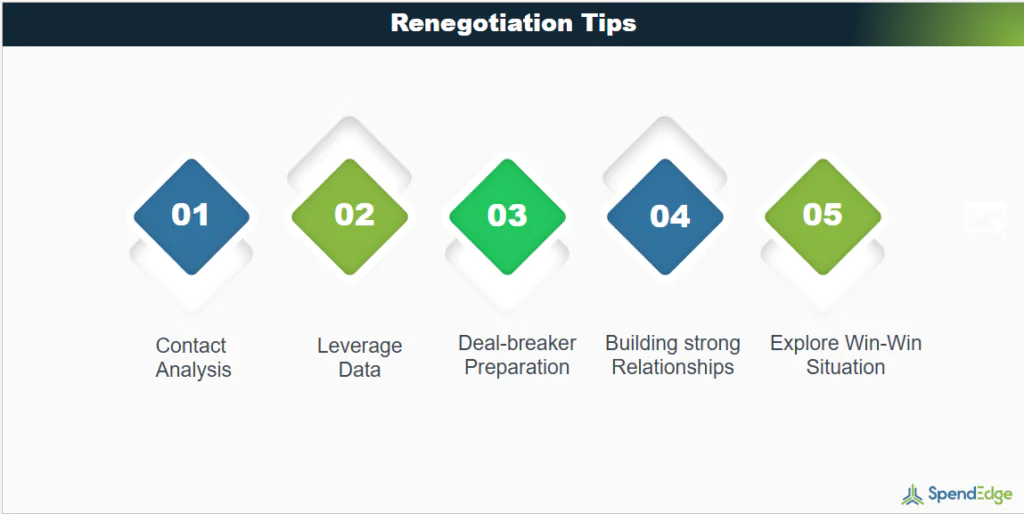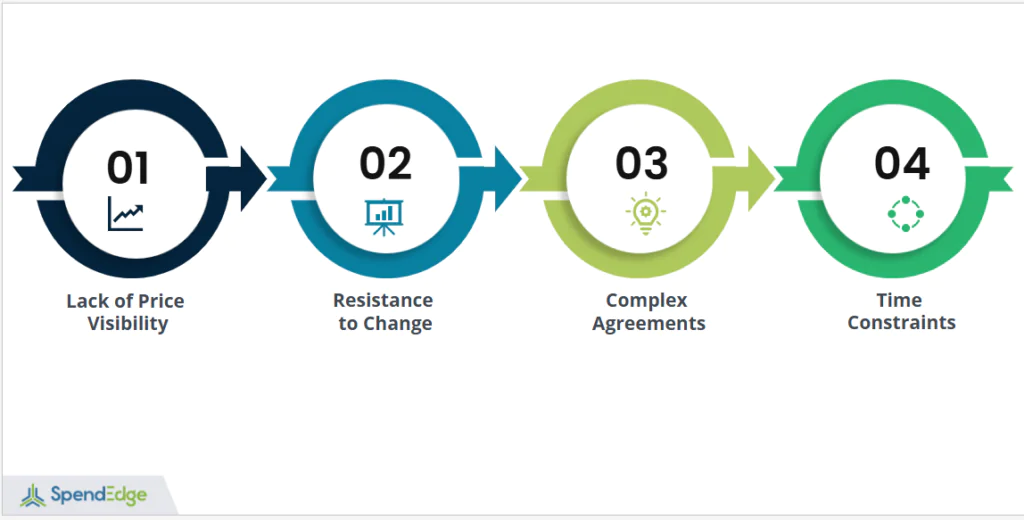By: Manpreet Kaur
Contract renegotiation is a critical skill for procurement teams across industries. Effective renegotiation can lead to better pricing, improved terms, and strengthened relationships with suppliers. This article provides comprehensive strategies and tips to help procurement teams navigate the renegotiation process and achieve the best possible outcomes.
Understanding the Importance of Contract Renegotiation
Contracts are the backbone of business relationships, defining the terms and conditions of engagements between organizations and their suppliers. Over time, these agreements may need to be revisited due to changes in market conditions, business needs, or supplier performance. Contract renegotiation allows organizations to align their agreements with current realities, ensuring they continue to receive optimal value.
Tips and Tactics for Successful Renegotiation

- Contract Analysis: Before entering renegotiations, thoroughly review the existing contract. Identify areas where the current terms may no longer be favorable or where improvements can be made. Pay special attention to pricing, delivery schedules, and service levels.
- Leverage Data and Analytics: Utilize procurement intelligence and data analytics to support your negotiation. Detailed insights into supplier performance, market trends, and pricing benchmarks can provide a significant advantage.
- Prepare for Dealbreakers: Identify potential dealbreakers that could derail negotiations. Having a clear understanding of your non-negotiables and alternatives will help you navigate difficult discussions.
- Build Strong Relationships: Effective negotiation relies on strong, collaborative relationships with suppliers. Approach renegotiation as a partnership rather than an adversarial process. This can lead to more favorable outcomes and long-term benefits.
- Explore Win-Win Solutions: Aim for outcomes that benefit both parties. Win-win solutions can lead to sustainable agreements and positive business relationships, ensuring both parties are committed to the terms.
Addressing Common Challenges in Contract Renegotiation

- Lack of Price Visibility: During contract renegotiation, lacking visibility into whether the company is paying the right price to suppliers can pose a significant challenge. This uncertainty makes it difficult to assess the fairness and competitiveness of the current pricing, potentially leading to overpayment or unfavorable terms. Therefore, obtaining clear visibility into suppliers’ cost structures, pricing models, and typical discounts is crucial. This insight enables the company to benchmark the performance and pricing of the existing vendor against other market players, ensuring that the company is engaging with the right partner and securing the most advantageous terms.
- Resistance to Change: Suppliers may resist changes to established contracts. Overcome this by presenting a well-reasoned case supported by data, demonstrating how the new terms can be mutually beneficial.
- Complex Agreements: Renegotiating complex contracts can be daunting. Break down the agreement into manageable parts and address each element systematically.
- Time Constraints: Renegotiation can be time-consuming. Plan ahead and allow sufficient time to conduct thorough analyses, engage stakeholders, and negotiate effectively.
Strengthening Your Negotiating Position

Use Right Negotiation Strategies: Employing the right negotiation strategies can help you secure the best prices and maximum benefits from suppliers. Effective strategies can include highlighting lower prices offered by competitors to create a competitive atmosphere, offering to pay upfront or in bulk to negotiate for discounts, leveraging renewal terms to lock in favorable conditions, and understanding hidden costs to avoid unexpected expenses. These strategies enable procurement teams to negotiate from a position of strength, ensuring they get the most value for their organization.
Understand Your Alternatives: Knowing your alternatives, such as other suppliers or different contractual arrangements, can enhance your negotiating position. This knowledge provides leverage and options if negotiations stall.
Maintain Flexibility: While having clear objectives is important, being flexible and open to creative solutions can lead to better outcomes. Flexibility demonstrates a willingness to collaborate and find mutually beneficial terms.
Communicate Clearly: Effective communication is key to successful renegotiation. Be transparent about your goals and constraints and encourage open dialogue to address any concerns.
How SpendEdge Can Help?
In today’s competitive market, effective negotiation is crucial for securing the best deals and maintaining strong supplier relationships. At SpendEdge we offer robust negotiation support services designed to empower companies with the insights and strategies needed for successful negotiations. Here’s how SpendEdge can help:
Comprehensive Price Comparison: We can provide detailed comparisons of prices offered by different companies for target products or services. Our analysis would also include a detailed break up of the supplier cost structure, their price models and contracting terms. This enables clients to understand the market landscape and identify the most competitive pricing available.
Price Discounts for Various Deal Sizes: Our analysis includes potential price discounts that can be achieved for different deal sizes. This helps clients understand the financial impact of various negotiation outcomes and plan their strategies accordingly.
Industry Best Practices: We can conduct a deep-dive assessment to understand the best practices adopted by other peer companies to contract with suppliers and their negotiation strategies.
Visibility on Negotiation Tactics: Our team offers in-depth visibility on effective negotiation tactics to achieve the best price discounts. By understanding various strategies and approaches, clients can enter negotiations with a well-prepared plan to secure favorable terms.
Case Studies and Success Stories: We provide comprehensive case studies and success stories that showcase how similar companies have successfully navigated negotiations. These real-world examples provide valuable lessons and strategies that can be applied to new negotiations.

Conclusion
Contract renegotiation is a vital process for procurement teams seeking to optimize agreements and maintain strong supplier relationships. By following the strategies and tactics outlined in this article, organizations can navigate the challenges of renegotiation, enhance their negotiating position through strong negotiation skills, and achieve favorable outcomes. With thorough preparation, effective communication, and a collaborative approach, procurement teams can successfully renegotiate contracts to meet their evolving needs and drive business success.
Contact us now to solve your procurement problems!
Author’s Details
Manpreet Kaur
Assistant Manager Presales – Sourcing and Procurement Intelligence
Manpreet is a Presales Consultant at Infiniti Research and is responsible for designing best fit solutions for clients belonging to different industries such as BFSI, Chemicals, Retail & CPG, F&B, Pharma and Healthcare, Energy, IT & Telecom and Automotive sectors. She specializes in sales, business strategy execution, and innovative solution design.




